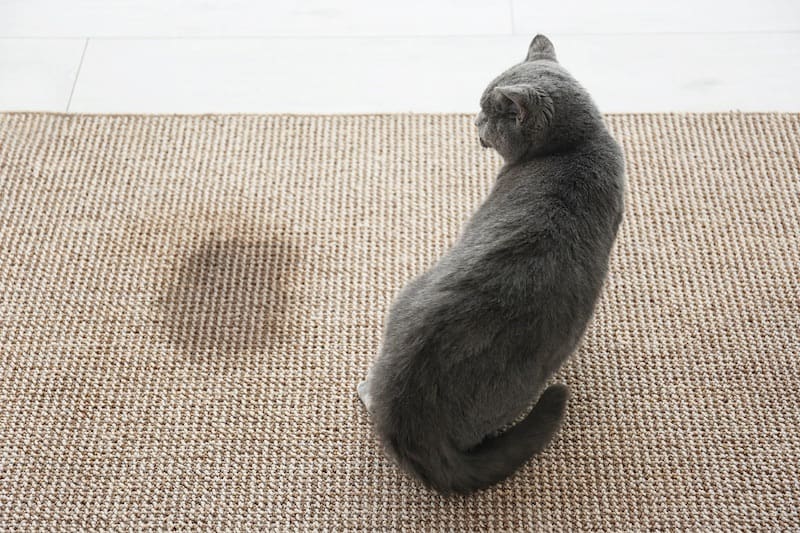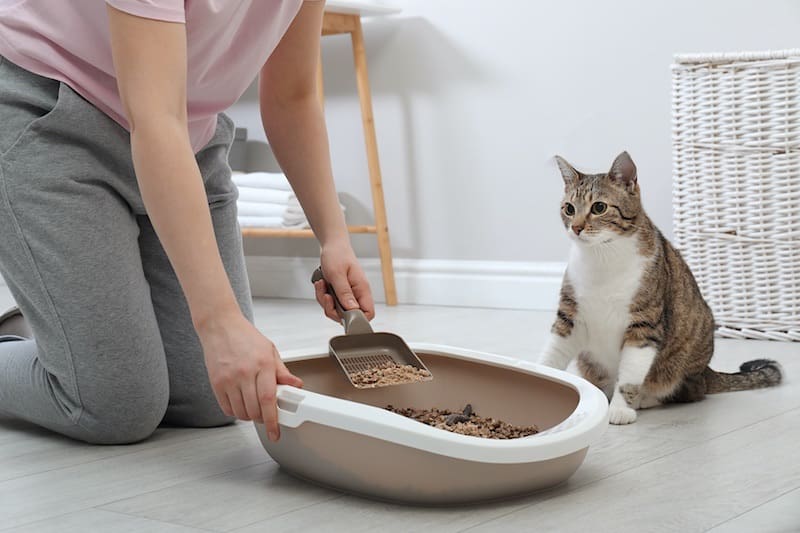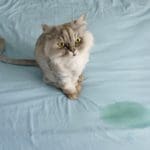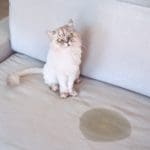Cats are beloved family members, but sometimes they can present behavioral issues that require attention. Inappropriate urination in cats is one such issue and it can be difficult to treat if you don’t know the cause.
To understand how to best approach improper urination in cats let’s first discuss what this problem looks like and what causes it before discussing potential solutions. Diagnosing the underlying issue is key as there are both medical and behavioural treatments available for cat owners who need help with their pet’s urinary habits.
With an understanding of why a cat may have developed an inappropriate elimination behaviour we can then take steps towards treating the problem so that your feline friend will once again feel comfortable using its litter box!
Understanding Inappropriate Elimination

What is Inappropriate Elimination?
This is when cats are caught in the act of peeing or pooing outside of their litter box. This behavior can be caused by a variety of medical, behavioral, and environmental factors. It’s important to understand why your cat may be exhibiting this behavior so that you can take steps to address it.
Causes of House soiling
Medical causes for Inappropriate elimination include urinary tract disease, kidney disease, diabetes, and bladder stones or crystals. If your cat has any underlying health issues that could cause them to have difficulty using the litter box properly then these should be addressed first before attempting any other solutions.
Behavioral causes such as stress or anxiety due to changes in environment or routine can also lead to house soiling. Finally, environmental factors like an unclean litter box or one located in a noisy area can make it difficult for cats to use the litter box appropriately.
Signs of Inappropriate Urination
House soiling in cats is a complex issue that can be caused by a variety of factors. By understanding the underlying causes, we can move on to diagnosing the problem and finding solutions.
Recap: Peeing outside their litter box can be caused by medical, behavioral, and environmental factors. Signs of this behavior include peeing outside the litter box or increased frequency of urinating. It’s important to identify and address any underlying issues before attempting other solutions.
Diagnosing the Problem
Medical Tests
In order to diagnose the problem in cats, medical tests are necessary. These tests can include a physical exam, urine analysis, and blood work. During the physical exam, your veterinarian will check your cat’s overall health and look for any signs of infection or other underlying causes that could be causing house soiling.
Urine analysis is used to determine if there is an infection present in the urinary tract or bladder. Blood work may also be done to rule out any other possible medical conditions that could be contributing to the problem.
Behavioral Tests
Behavioral tests can help identify what might be causing your cat’s inappropriate urination behavior. Your veterinarian may recommend observing your cat’s behavior at home and keeping a diary of when they go outside their litter box, as well as noting any changes in their environment that might have triggered it such as new pets or people coming into the house or changes in routine like travel or moving homes.
Additionally, behavioral modification techniques such as positive reinforcement training can help reduce stress levels which can lead to fewer episodes of inappropriate urinating behaviors from cats who are feeling anxious or overwhelmed by their environment.
Environmental Tests
Accurately diagnosing the problem of inappropriate urination in cats is essential for successful treatment. With a combination of medical, behavioral and environmental tests, veterinarians can pinpoint the underlying cause and begin to develop an effective plan for treating it.
Recap: Inappropriate urination in cats can be diagnosed through medical, behavioral and environmental tests. These tests include physical exams, urine analysis, blood work, observation of behavior at home and positive reinforcement training.
Treating the Problem: Medical Solutions
Medications:
Medication is sometimes used to treat cats with inappropriate urination. These medications can help reduce anxiety and other underlying causes of the behavior, such as urinary tract infections or bladder stones. Common medications include anti-anxiety drugs, tricyclic antidepressants, and anticonvulsants. It’s important to discuss all options with your veterinarian before starting any medication for your cat.
Surgery:
Surgery may be recommended if a physical cause is identified for this behavior. This could include removing bladder stones or correcting a birth defect that affects the urinary system. Your veterinarian will discuss all surgical options with you before proceeding with any treatment plan for your cat.
Dietary changes are often recommended when treating cats who have been diagnosed with inappropriate urination behaviors due to medical conditions like diabetes or kidney disease. Ensuring that your cat has access to fresh water at all times and providing them with high quality food can help manage these conditions and improve their overall health and wellbeing.
Additionally, reducing stressors in their environment can also be beneficial in managing this type of behavior problem.
Medical solutions can be a great way to treat inappropriate urination in cats, but it is also important to address the behavioral aspects of the problem. Next, we’ll look at some behavioral solutions that can help reduce peeing problems in cats.
Treating the Problem: Behavioral Solutions
Training your cat can help reduce stress-related peeing problems. Positive reinforcement techniques, such as clicker training, are a great way to teach cats the behaviors you want them to exhibit. Clicker training involves using a small device that makes a clicking sound when pressed; this sound is associated with rewards like treats or praise for good behavior. This helps cats learn which behaviors are desired and reinforces those behaviors through positive reinforcement.
Litter Box Hygiene Tips to Reduce Peeing Problems in Cats:

Proper litter box hygiene is essential for reducing house soiling in cats. Make sure the litter box is kept clean by scooping it out at least once per day, more often if needed.
Additionally, provide multiple litter boxes throughout the house so that your cat always has access to one no matter where they are in the home. It’s also important to use an unscented clumping litter that won’t irritate your cat’s sensitive nose or paws.
Reducing stressful situations can be key for treating house soiling. If there have been changes recently such as moving into a new home or introducing another pet into the household, these changes may be causing stress for your cat leading them to act out inappropriately by peeing outside of their litter box.
Try providing extra attention and affection during times of transition or change so that your cat feels secure and safe within their environment.
Behavioral solutions are an effective way to treat house soiling in cats, and with the right tools and techniques, you can help your cat overcome their peeing problems.
Recap: Proper litter box management and positive reinforcement training techniques can help reduce stress-related peeing problems in cats. • Clean the litter box regularly • Provide multiple litter boxes throughout the house • Use unscented clumping litter • Provide extra attention during times of transition or change
Conclusion
It is important to understand that urinating inappropriately in cats can be caused by a variety of medical, behavioral or environmental factors. You need to work with your veterinarian to diagnose the underlying cause so that an appropriate treatment plan can be developed.
Medical treatments may include medications, surgery or dietary changes while behavioral solutions may involve training and reinforcement techniques, litter box management or reducing stressful situations. With proper diagnosis and treatment, most cats will overcome these issues and live happily as an indoor cat.
FAQ
How do you fix feline inappropriate urination?
Inappropriate urination in cats is usually caused by a medical or behavioral issue. If your cat has been spayed/neutered, it’s important to first rule out any underlying medical conditions such as urinary tract infections, bladder stones, diabetes or kidney disease.
If these are ruled out, then the problem may be due to stress or anxiety and can be addressed with environmental enrichment and behavior modification techniques. These include providing litter boxes in multiple locations around the house; using larger litter boxes with low sides; cleaning the box regularly; avoiding sudden changes in routine; providing scratching posts and other outlets for playtime activities; ensuring there is enough space for all cats in the household; reducing conflict between cats if present.
What is the most common cause of house soiling in cats?
The most common cause of Inappropriate elimination in cats is stress. Cats may experience stress due to changes in their environment, such as a new pet or person entering the home, or from feeling threatened by other animals.
Other causes can include medical issues like urinary tract infections and kidney disease, as well as behavioural issues like litter box aversion. It’s important to identify the underlying cause of your cat’s behaviour so that it can be addressed appropriately.
Inappropriate urination in cats medication?
The best medication for inappropriate urination in cats is a type of tricyclic antidepressant called clomipramine. This drug works by increasing serotonin levels, which helps reduce the urge to urinate outside the litter box. It can take several weeks for this medication to become effective and it should be given under veterinary supervision.
Other medications may also be prescribed depending on the underlying cause of the behavior, such as hormones or anxiety-related issues. Always consult with your veterinarian before giving any medications to your cat.
How do you tell the difference between feline inappropriate elimination and urine marking?
Feline inappropriate elimination is when a cat urinates or defecates outside of their litter box. This can be caused by medical issues, stress, or other environmental factors. Spraying is when a cat stakes its territory with urine marking and usually occurs on vertical surfaces such as walls or furniture.
It is often done to mark boundaries and show dominance in the home. The key difference between inappropriate elimination and spraying is that inappropriate elimination does not involve marking with urine, whereas spraying does involve marking with urine.
Why do some cats soil their owner’s bed?

Having a cat that soils your bed can be one of the most disheartening experiences for any pet owner. But why do some cats choose to urinate or defecate on their owners’ beds? While it is difficult to pinpoint the exact cause, there are certain factors that may contribute to this behaviour in cats.
First, it is important to understand that cats use scent as a way of marking their territory and establishing dominance. When a cat squats and urinates on an item of furniture, such as a bed, they are attempting to establish their presence.
This behaviour is particularly common among multi-cat households where one cat may want to assert themselves as the dominant animal in the house.
Anther potential factor could be stress or anxiety related issues. You should learn how to keep an indoor cat off your bed for this and several other health related issues.
How often should cats urinate?
Cats are notoriously known for their cleanliness habits and independent nature. But how often should cats pee? Knowing the answer to this question can help owners keep their cats healthy and happy.
The frequency of urination will depend largely on the age, overall health, and size of your cat. Generally, an adult cat should pee anywhere between 2-4 times a day while kittens may need to go as much as 8 times a day. However, if you notice your cat going more or less often than usual then it could be indicative of an underlying medical condition that needs to be addressed by your vet.
Urinary tract infections are common in cats so look out for signs such as increased urination frequency or difficulty passing urine. If you spot any of these symptoms then make sure to bring your pet to the vet right away for proper diagnosis and treatment.
Is my cat peeing for attention?

It is possible that cats may urinate outside of the litter box when they feel neglected or ignored. This behavior can be accompanied by excessive meowing, scratching at furniture or following you around begging for your attention. Cats may even attempt to sleep on your bed if you don’t provide enough quality time with them. If this happens, it is important to address these behaviors immediately as they can be signs that your cat is feeling lonely or stressed.
Fortunately, there are plenty of ways to keep your feline companion happy and healthy in between visits from the veterinarian.
Do cats pee when they’re stressed?
When it comes to cats, they are creatures of habit. So when their routine is disrupted or their environment changes, it can cause them stress. One behavior that might manifest itself as a result is cat stress urination outside the litter box – but why do cats pee when they’re stressed?
The answer lies in the way that cats communicate with each other and with humans. Peeing outside the litter box can be a sign of anxiety or fear. For example, if a cat feels threatened by another animal or person that has joined the family, this could be the way they choose to express themselves and show that they’re not happy.
Does putting down a cat for urinating outside his litter box really happen?
Unfortunately yes. Every day cats are taken to the vet to be put down because the cat is urinating on the furniture or floor. Even if the cat owner drops his pet off at a shelter, it will be practically impossible to find a new home for a cat with a history of innaproprate urination and the cat will almost certainly be euthanised.
This is not a reason to euthanise a cat. Once the underlying problem is uncovered inappropriate urination in cats is usually an easy fix. Talk to your vet for help and advice rather than taking your cats life for something that could be as simple as a urinary tract infection.





